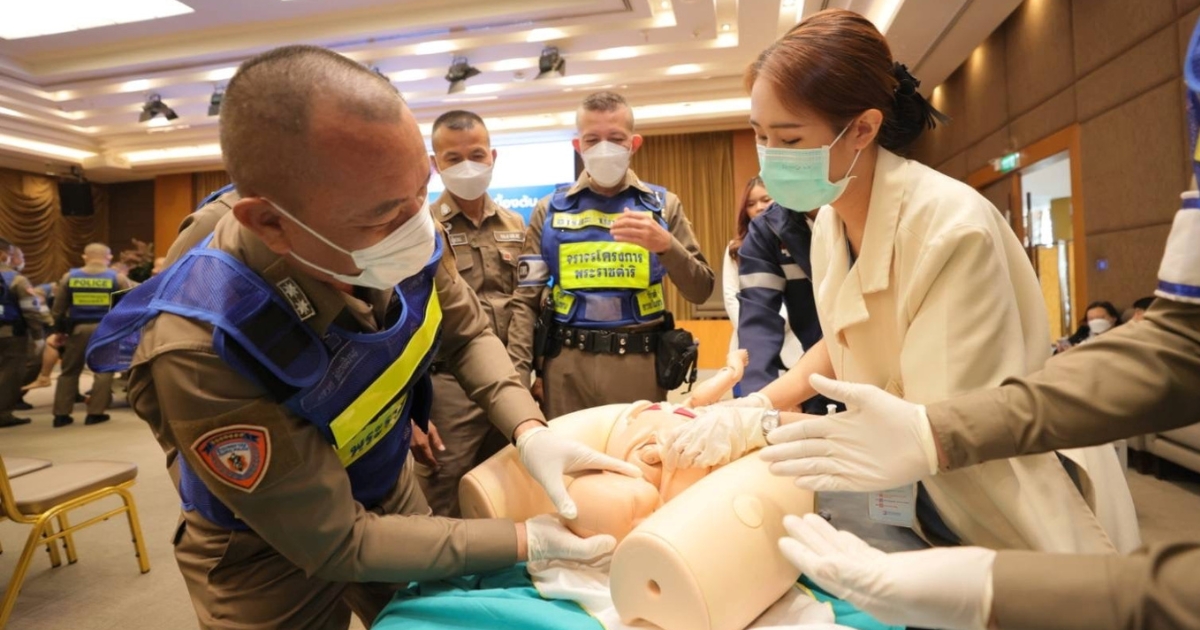Bangkok Hospital organized the 9th Basic Life Support and Emergency Childbirth Training for traffic police, aimed at enhancing skills in assisting with roadside childbirth and managing crisis situations.
Bangkok Hospital, in collaboration with the Traffic Police Division and JS100, has organized the “9th Basic Life Support and Emergency Childbirth Training 2024″ for Bangkok Traffic Police (Royal Initiative Project), Traffic Police Division. The training aims to equip officers with skills to assist the public, including transporting patients, injured individuals, and pregnant women close to delivery to the hospital. Additionally, the training covers basic first aid, basic life support (CPR), and the use of AED devices. This event was held on May 20-21, 2024.
Dr. Ekkit Surakarn, Deputy Director of Bangkok Hospital, stated that Bangkok Hospital Headquarters is pleased to host the first aid and emergency childbirth training for the royally initiated traffic police; this year marks the 9th iteration of the training. The topics include basic life support, initial emergency response, handling childbirth in various situations, and neonatal care before hospital transfer. About 200 officers from the Royal Project Traffic Police Division and JS100 volunteers participated. The training included lectures, demonstrations, and hands-on practice led by experienced hospital staff and medical teams, ensuring participants can apply the knowledge effectively in real-life emergencies on the road.
Air Marshal (Special) Dr. Paisal Chantarapitak, Advisor to the Director of Bangkok Hospital for Special Affairs, highlighted that the royally initiated traffic police responsibilities extend beyond traffic management to providing public assistance. This includes transporting patients, injured individuals, and pregnant women close to delivery to hospitals, offering initial first aid, and stabilizing patients until they reach medical facilities. This program aims to enhance the knowledge and experience of the participating officers, enabling them to provide an accurate and efficient emergency response. This training will help ensure proper patient transfer before reaching the hospital, which is crucial for initial emergency care. Moreover, the initiative fosters collaboration between government agencies and other organizations in assisting and transferring patients, coordinating traffic during patient transport, and supporting governmental efforts.
Dr. Weerawich Pornwattanakrilert, an obstetrician-gynecologist at Bangkok Women’s Health Center, Bangkok Hospital, said that in emergency childbirth situations, several crucial questions must be asked: 1. Have you previously given birth? 2. How frequent are the contractions? 3. Has your water broken? 4. Is there rectal pressure? Upon observing advanced labor signs, such as water breaking or cervical dilation to 10 cm, the assisting individual should gather necessary items: a towel, a sterile bulb syringe for cleaning the newborn’s mouth and nose, sterile gauze, and sterile gloves.
When assisting the mother, it is essential to: 1. Support the baby’s head and body to prevent falling. 2. Clear mucus from the baby’s mouth and nose to avoid choking. 3. Ensure the baby is kept warm by cleaning and wrapping them. If transportation to a hospital is unavailable, or if the birth is imminent within five minutes and no nearby hospital can accommodate the patient, it is advisable not to move the patient.
Dr. Noppasit Thanateerapong, an emergency medicine physician at the Bangkok Emergency Service Center, emphasized the importance of basic life support and first aid in emergency preparedness. For unconscious individuals suspected of sudden cardiac arrest, immediate resuscitation with chest compressions (CPR) and the use of an Automated External Defibrillator (AED) is crucial before medical personnel arrive. These actions are vital for the patient’s survival.
CPR can be performed by anyone, with chest compressions at a rate of 100-120 per minute. Using an AED within the first few minutes of cardiac arrest can increase the patient’s chance of survival by 2-3 times. Promoting CPR knowledge and skills among traffic police, bystanders, and the general public is essential in effectively reducing mortality rates from sudden cardiac arrest.
Dr. Matinee Maipang, CEO of Group 1 and Director of Bangkok Hospital, along with Captain (Special) Dr. Paisal Chantarapitak, Advisor to the Director of Bangkok Hospital for Special Affairs, and Dr. Ekkit Surakarn, Deputy Director of Bangkok Hospital, were honored at the opening ceremony. Also present was Pol. Maj. Gen. Surached Bundit, Commander of the Traffic Police Division, and Pol. Col. Jirakrit Jarunapat, Deputy Commander of the Traffic Police Division. Dr. Prapaipat Komapat, Advisor to the Executive Chairman of Radio Station JS.100, spoke at the event about the importance of public participation in acquiring basic first aid knowledge. This enables the public to report incidents effectively, ensuring that injured individuals receive prompt medical attention.

